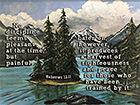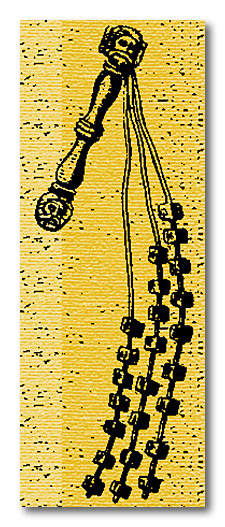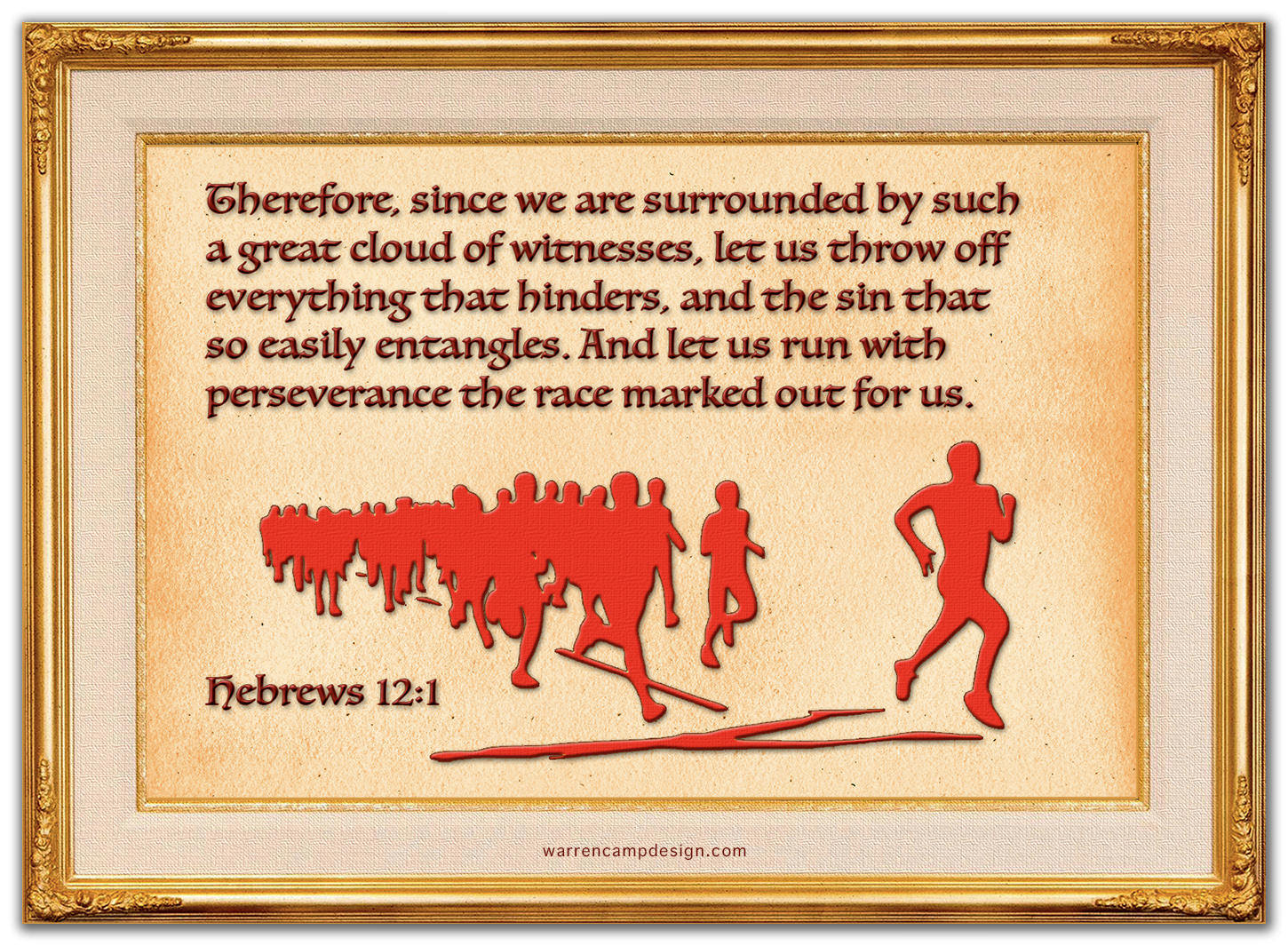Hebrews 12:1–11 . . .
“Faith’s Pioneer and Perfecter”
Following our two previous faith-focused studies, titled “The Faith of Patriarchs, Moses, and Others” (11:20–31) and “More Faith Heroes” (11:32–40), we come to an essential follow-up chapter that ought to motivate and stimulate us to endure faithfully. The author will encourage all Christian readers to stay in "the race marked out for us" by following Christ's example, knowing that we're God’s children who've been endowed by his very enabling grace (12:1–4). He'll urge us to be encouraged and follow the examples of many disciplined Old Testament saints — "a great cloud of witnesses" — who persevered amid persecution by focusing on the person and work of Christ (vv. 5–11).
Today's study should make it clear to us that, in the midst of adversity, we must pursue the goal that we find in Christ Jesus. If we strive to finish a race, we must look to him in the midst of suffering as well as discipline (vv. 1–2). We're encouraged, even exhorted, to strengthen ourselves so that we'll surely persevere and not stumble.
Jesus Is the Pioneer and Perfecter of Faith (12:1–3)
In our three opening verses, Christian life is compared to an athletic race; it must be run with endurance, lest the competitors grow faint and give up before reaching the finish line.
12 1Therefore, since we are surrounded by such a great cloud of witnesses, let us throw off everything that hinders and the sin that so easily entangles. And let us run with perseverance the race marked out for us, 2fixing our eyes on Jesus, the pioneer and perfecter of faith. For the joy set before him he endured the cross, scorning its shame, and sat down at the right hand of the throne of God. 3Consider him who endured such opposition from sinners, so that you will not grow weary and lose heart (12:1–3).
A faith-filled life must be lived similarly. Like the runner needing to shed clothing before beginning to run, we too must cast aside the sins that easily entangle and hinder us (v. 1). And like the runner who runs the race to win a coveted prize, we must seek our prize, the Lord Jesus Christ, who'll motivate us to run the race to its finish (vv. 2–3). God maps out a course for our lives, including victories and apparent defeats (e.g., suffering and persecution). His mapped-out course for us is the same course that he himself had run.
The author's original audience had been fighting against sin; they began to suspect and fear that their struggles would be too hard to bear. However, he reminds them that things could be much worse, since they hadn't yet shed their blood to resist sin (v. 4). The reminder for us is that we have to face God's enemies — Satan's representatives, our neighbors or friends who care nothing for Christ. Every one of his enemies plots to shatter our faith in Jesus, continually attempting to have us give up on Christ and no longer run our race.
Jesus is the creator of faith, the object of our faith, and the sustainer and "pioneer and perfecter of faith" (v. 2). He was motivated by the "joy set before for him," which was the delight and jubilation that Father God had set out for him. As a result, Lord Jesus "endured the cross, scorning its shame," yet willingly experienced the shame of a public crucifixion, punctuated by the crowd mocking him and the desertion of his trusted disciples. We read in v. 3 that Jesus not only endured the shame of the cross but endured "opposition from sinners" who cried out for his execution while demanding the release of Barabbas the terrorist. Appreciating all that Jesus underwent, Father God honored him by raising him from death, then seating his Son gloriously "at the right hand of the throne of God."
We must trust in God, despite what might come our way; we're to resist the sinful urge to abandon Christ in favor of comfort and physical safety; and we're obliged to acknowledge Christ as Lord, even if such effort causes our desertion, financial loss, even death. The original readers of "Hebrews" had been vigorously battling such adversaries (10:32–34) during their temporary stumbling. They needed encouragement to persevere and remain faithful soldiers.
A Christian life isn't for the faint of heart. It requires a genuine effort, battling the world, the flesh, and the devil. As a result of these battles, we'll suffer defeat but also enjoy great victories. On occasion, we'll feel exhilarated, but sometimes discouraged. No matter the battle or enemy, we must never ever give up! The magnificent victory over Satan that Jesus had won on the cross has already decided the war's outcome. We're to faithfully trust in him continually. He asks us to take up our cross and follow him, dying daily to our sin, being renewed by him. He summons us to fight the good fight of faith.
We shouldn't focus on and follow chapter 11's Hall of Faith heroes. All were flawed men and women who were commended for their trust in God. We're to fix our eyes only on Jesus because he alone can save, comfort, and support us. Let's look to him as we faithfully run the race before us, with endurance, because he's our prize and reward.
God’s Loving Chastisement of His Children (vv. 4–6)
Verse 4 reminds us that in our all-out match against sin, others have suffered far worse than each of us, to say nothing of what Jesus went through — all that bloodshed! So we aren’t to feel sorry for ourselves.
God Disciplines His Children
4In your struggle against sin, you have not yet resisted to the point of shedding your blood. 5And have you completely forgotten this word of encouragement that addresses you as a father addresses his son? It says,
“My son, do not make light of the Lord’s discipline,
and do not lose heart when he rebukes you,
6because the Lord disciplines the one he loves,
and he chastens everyone he accepts as his son” [taken from Proverb 3:11–12] (12:4–6).
The text of vv. 4–11 develops the Christian's point of view regarding enduring hardship and opposition. This epistle's Jewish-Christian readers were extremely discouraged because they started to experience significant social and economic persecution. However, they hadn't yet become subject to the shedding of blood. In vv. 4–6, the writer chastised them by saying, Remember, it isn't as bad as it could be! You haven't yet shed blood. Don't forget, behind those difficulties that you'll go through is a Father's loving heart!
When we disobey God, he doesn't expect us to offer another sacrifice, as the Jews were accustomed to doing; he expects a confession of sin. The quotation in vv. 5–6 is from Prov. 3:11–12 in which Solomon had spoken to his son, helping him manage pending trouble and hardship. The Septuagint version quoted therein (shown in the passage above) speaks of the Lord's chastisement and punishment: Chastisement is verbal correction; punishment (in this case "scourging") is meant to highlight the rebuke. Putting this punishment into context, the scourging of that day amounted to severe Roman punishment that involved a leather whip having embedded metal pieces on its end.
Our Lord suffered immense torment — the wrath of men and of the Father. The readers had not yet shed blood for their faith. But even if they were to die a martyr’s death, it would never begin to compare with Jesus' suffering. You may wish to think of it this way: Our suffering does not hold a candle to his, yet his suffering is what we Christians deserve.
God uses chastisement, not loss of salvation, to correct believers; in the same way, an earthly father uses chastisement to correct his children. Father God does the judging and chastising. The point being made in v. 6 is that Christians shouldn't respond to persecution or hardships with bitterness or despair, especially if and when our experiences aren't as extreme as what others have endured. Instead, we should see God's discipline — his "training" — as a sign that he's fully engaged in our lives and got a plan and purpose for us to fulfill.
“Endure Hardship as Discipline” (vv. 7–8)
The author gives this assurance in the next two verses: God is educating you; that’s why you must never drop out. He’s treating you as a dear child. The trouble you’re now in isn’t punishment; it’s training, a child's normal experience. Only irresponsible parents leave their children to fend for themselves.
7Endure hardship as discipline; God is treating you as his children. For what children are not disciplined by their father? 8If you are not disciplined — and everyone undergoes discipline — then you are not legitimate, not true sons and daughters at all (12:7–8).
The original audience of the epistle needed to be reminded that God purposely disciplines his children. Their suffering had caused them to question their status as Father God's children. Many wanted to go back to the old covenant to free themselves from suffering, thereby equating the assurance of their God-given sonship with a life that was to be free from suffering (vv 5–7). Their assumption was obviously false; clearly, their sufferings proved that they were definitely God’s sons. He allowed these adversities to come into their lives because he loved them and wanted them to be corrected from their sin (see Prov. 23:13–14).
In the midst of our suffering, we must seek God so we can determine conclusively whether or not he's attempting to discipline us with it. When we suffer, it's appropriate to ask whether or not our pain is due to unconfessed sin, and wonder whether God is trying to wake us from our tribulations; we must focus on God in order to learn whether or not he's trying to discipline us with it. When we suffer, it's appropriate to ask whether or not our pain is due to unconfessed sin. It's wise to determine if God is trying to wake us from slothfulness so that we may diligently pursue him.
Readers of this passage, then and today, ought to realize that we're not illegitimate children for whom no future has been prepared. Instead, we're legitimate children who need effective discipline so we can develop and mature properly. We ought to hang tough and "endure hardship as discipline" because our burdens are proof that we're beloved children, not illegitimates. When we see that God disciplines us through suffering, we ought to thank him for doing so. His attentive acts of discipline prove that he loves us and that we're his legitimate children (v. 8). Only Father God's legitimate children will inherit heaven.
A Human Father’s Discipline vs. God’s Discipline (vv. 9–11)
We respect our own parents for training us well and not spoiling us; so why not embrace God’s training so we can truly live?
9Moreover, we have all had human fathers who disciplined us and we respected them for it. How much more should we submit to the Father of spirits and live! 10They disciplined us for a little while as they thought best; but God disciplines us for our good, in order that we may share in his holiness. 11No discipline seems pleasant at the time, but painful. Later on, however, it produces a harvest of righteousness and peace for those who have been trained by it (12:9–11).
While we were children, our parents did what seemed best to them. But God is doing what is best for us, training us to live according to God’s best plans for us. Discipline is never fun; it always feels like it’s going against the grain. Later, of course, discipline pays off handsomely! It’s the well-trained who find themselves spiritually mature in their relationship with God.
Here in vv. 9–11, the writer cites a second reason for us to adopt and incorporate patient endurance: While we were children, our earthly fathers disciplined us, despite the mistakes they likely made. Yet we respected them for their sincere efforts that were obviously meant for our well-being. How much more should we adhere to and follow our God's discipline, since he acts most wisely, never errs, and makes every effort to provide opportunities for us to share and abide in his perfect character!
"But God disciplines us for our good, in order that we may share in his holiness" (v. 10). Human fathers, even with the best of intention, can only imperfectly put us in our place because they lack perfect knowledge. However, the all-knowing God can humble us perfectly, with better and more lasting results coming from the best earthly father. God's discipline for his children always has their eternity in view.
In v. 11, "discipline" (Greek paideia) refers to "the systematic training of children, including the idea of correction for wrongdoing." The writer also references the idea of being "trained," from the Greek word gumnazo, literally referring to "vigorous exercise," figuratively meaning to exercise, so as to discipline oneself in the ethical "gym." God's use of discipline, though unpleasant at the time, is much like the training of an athlete. Afterwards, the athlete sees growth and development as a result of those experiences. It's important to realize that our disciplinary pain isn't the whole story. There is always a "later on" from which we're to reflect, learn, and benefit. Thankfully, God's disciplinary actions produce "a harvest of righteousness and peace" for all of his trained and well-disciplined children. Such spiritual fruit must be observable in every Christian's life.
Closing Considerations
Every step in a marathon reaffirms a runner's commitment to keep going until he or she triumphantly crosses the finish line. One word that summarizes our earthly race is "endurance," which implies going through something difficult without quitting. It includes the concept of abiding under hardship with patient, sustaining perseverance.
The very best way to "keep on going without quitting" is to fix our eyes on Jesus (v. 2), not on life's hardships and difficulties. He clearly set the pattern for us by enduring the cross for the joy set before him. When we finally cross the finish line, we'll enter into Christ's presence and be with him forever. That's why Scripture reminds us to lay aside every encumbrance that hinders our spiritual race. Once we cross the finish line and see Christ, face to face, all worldly pleasures will fade in comparison to the joy of hearing him say, "Well done, good and faithful servant" (Matthew 25:21).
When we face our trials of discipline, we usually just want to find a way out of that difficulty and move on. But in every painful situation, God is working to glorify our life and make us righteous. He knows our weaknesses; he sees when we compromise and fall into sin. And, as our loving Father, he intervenes to bring us back into obedience and fellowship with him. When we realize our conviction of sin, we mustn't grumble and groan and refuse to repent and change; doing so intensifies the pain and sets us up for his further discipline to show us his love for us.
Let's make a concerted effort to choose the better option: repentance and obedience. When we agreeably allow our trials to train us in holiness, we'll surely produce "a harvest of righteousness and peace." Add to that the fact that our compliance with the will of our heavenly Father is bound to bring joy to his heart.
- Q. 1 As a Christian, how have you "run the race"? . . . How have you thrown off sin and hindrances? . . . Have you yet "run with perseverance"? . . . How have you "fixed your eyes on Jesus"?
- Q. 2 What benefit(s) has God's discipline brought to you?
Hebrews 12:1–11
New International Version (NIV) or view it in a different version by clicking here.
— Listen to chapter 12, narrated by Max McLean.







